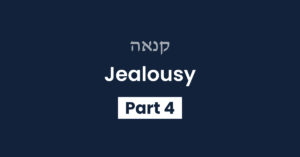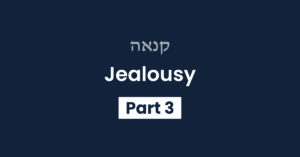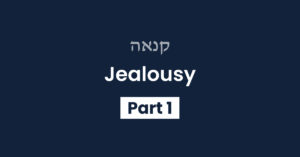We have been focusing this month on the middah of jealousy, in honor of Rachel Imeinu whose Yahrtzeit will be this coming Tuesday (11 Cheshvan).
Last week, we discussed how one way to combat jealousy is to dispel the myth that lies (pun intended!) at the root of all jealous thoughts. All jealousy comes from noticing what other people have, and thinking that we deserve to have it, too. If my friend has a huge house, an impressive job, or a great memory, then I deserve to enjoy those things too. When I don’t have these things, I feel jealousy and pain.
But the truth is that Hashem created each of us for a different purpose, to fulfill different roles on this earth. Hashem therefore gave each of us a different set of “tools” to enable us to fulfill our unique roles. Perhaps my friend was given the “tool” of superior intelligence so that he can become a Rebbe and teach Torah, whereas I was given the “tool” of being a great conversationalist so that I can excel in the mitzvah of hachnosas orchim. We will never truly know why Hashem gave us our “tools” or what exactly Hashem expects us to do with them, but we do know that everyone is different and needs different things.
While this concept makes sense in theory, it can sometimes feel difficult to integrate it into our hearts. We might recognize intellectually that Hashem knows what’s best for us… but we still feel like there are so many things we need!
Maybe you have been single for a long time and feel you really do need to get married already. Maybe you have been stuck in an awful job for a long time, and feel like you really do need a different one. Maybe you have been struggling with an illness for a long time and feel like you really do need to be healed. Maybe you have been studying for a difficult, serious exam, and feel like you really do needto pass.
When we look around and see so many people who are enjoying things we don’t have, it can be very painful. We can try to remind ourselves that everyone is unique and needs different things… but the pain might still be hard to push away.
What then?
Like an Infant on Its Mother
Whenever we feel this type of inner pain, it means it’s time to do some deeper emotional work. We have to remind ourselves and try to picture how Hashem is our loving Father who takes care of all our needs.
Hashem is our loving Father who takes care of all our needs.
Dovid HaMelech helps us visualize this in Tehillim, when he says: “Im Lo Shivisi V’Domamti Nafshi Kigamul Alei Imo – My soul is like a silent infant upon its mother.”1 Picture a baby resting peacefully on his mother’s shoulder. The child doesn’t worry about what he will wear the next day, or how he will have food for tomorrow. He just has total trust that his mother will provide for all his needs. He rests peacefully and silently, knowing that all of his needs are being taken care of.
This is the kind of deep trust that we need to develop with regard to Hashem. We need to feel deep inside that Hashem will take care of us, and we don’t need to worry about anything. If there is something that I need, Hashem will give it to me. And if there is something I am missing, then it means I don’t need it, or at least I don’t need it right now. This may be hard to swallow, but it is part of our important spiritual journey on this earth, to develop this deep loving trust and bitachon in Hashem.
If there is something that I need, Hashem will give it to me.
Imagine a first-grade boy named Chaim who sees that his friend Yaakov just got a new pair of glasses. “Wow,” he thinks to himself. “Those glasses look so cool! I want glasses like that too!” He comes home from school and runs over to his father. “Abba,” he says. “Chaim got a pair of glasses today, and he looks so cool in them! I want glasses too! Can I get glasses please please please please please?”
Chaim’s father turns to him with sympathy in his eyes. “Chaim,” he says. “I know how much you want glasses so you can look cool like your friend does… but, zeeskeit, you don’t need glasses now. If you would have glasses, they would hurt your eyes. Don’t worry – if you ever need glasses one day, Ima and I will make sure that you have them. But for now, it would be damaging for you to be wearing glasses like Yaakov.”
Just as Chaim’s father knows what’s best for him and promises to take care of him, Hashem, too, is the only One who knows what’s best for us, and promises to always take care of us. If there is something we need, He will give it to us, and if there is something we don’t need, then He wont.
We say in Birkas HaMazon: “Hu Heitiv, Hu Meitiv, Hu Yeitiv Lanu… Hu Gim’lanu, Hu Gom’leimnu, Hu Yigmaleinu La’ad – Hashem did good things for us in the past, He does good for us now, and He will continue to do good for us in the future. Hashem performed acts of kindness in the past, He is performing kindnesses for us now, and He will continue to perform acts of kindness for us in the future.” Every time we bentsch, we express our appreciation to Hashem and our trust that He will continue to take care of us just as He has done for our entire lives, until today.
The more we develop this deep, loving trust in Hashem, the less we will feel jealous of other people. Even when we notice that other people have things that we don’t have, we can just gently remind ourselves that if I don’t have it now, it means I don’t need it, and I am sure Hashem will always provide for whatever I need.
This week, let’s practice noticing how much Hashem takes care of us, so that we will be less worried about whatever we feel we are missing.
| Sources: [1] Tehillim 131:2 |
Your Challenge
Once a day, (a) notice 1 thing that you HAVE, and thank Hashem for it; and (b) notice 1 thing that you DON’T have, and express your trust that if Hashem didn’t give it to you, it means you don’t need it right now.
FOR EXAMPLE:
- (a) Thank you, Hashem, for giving me lunch today.
- (b) I see you didn’t make me a millionaire yet, so I guess that means I don’t need to be a millionaire yet in order to fulfill my life’s purpose.
- (a) Thank you Hashem for giving me strength to wake up this morning.
- (b) My back is hurting right now, and I guess if You have not healed it yet, it means that I don’t need it to be healed in order to fulfill my purpose in life.
- (a) Thank you, Hashem for giving me a warm house.
- (b) I don’t yet have a gown to wear for my sister’s wedding next week even though I have tried to find one, so I guess that means Hashem that You have decided I don’t need it yet.
Torah Questions
- Why was Eisav jealous of Yaakov? (See Bereishis 27:41)
- What did Eisav want to do to Yaakov as a result of his jealousy?
- What did Yaakov tell his sons to do, in order to avoid making other people jealous of them? (See Rashi on Bereishis 42:1 or Taanis 10b)
- According to Mishlei 14:30, what happens to a person who is jealous?
- According to Shir HaShirim 8:6, “jealousy is as hard as _____”?
- According to Bava Metzia 107b, what daily habit helps one avoid jealousy?
Questions to Ponder
- The Hebrew word “kinah” can refer to both jealousy and zealousness. What do you think is the relationship between those two feelings?
- Rav Tzadok HaKohen writes that jealousy and ta’avah (lust/desire) are at the root of all bad middos, and that Torah and chessed are the only cure for these bad middos. How do you think learning Torah and doing acts of kindness can help a person let go of his jealousy and desires?
- The Sefer Chochmah U’Mussar writes that jealousy stems from haughtiness. How does hautiness cause jealousy?
- The Midrash says that jealousy is related to anger. What do you think is the relationship between jealousy and anger?





